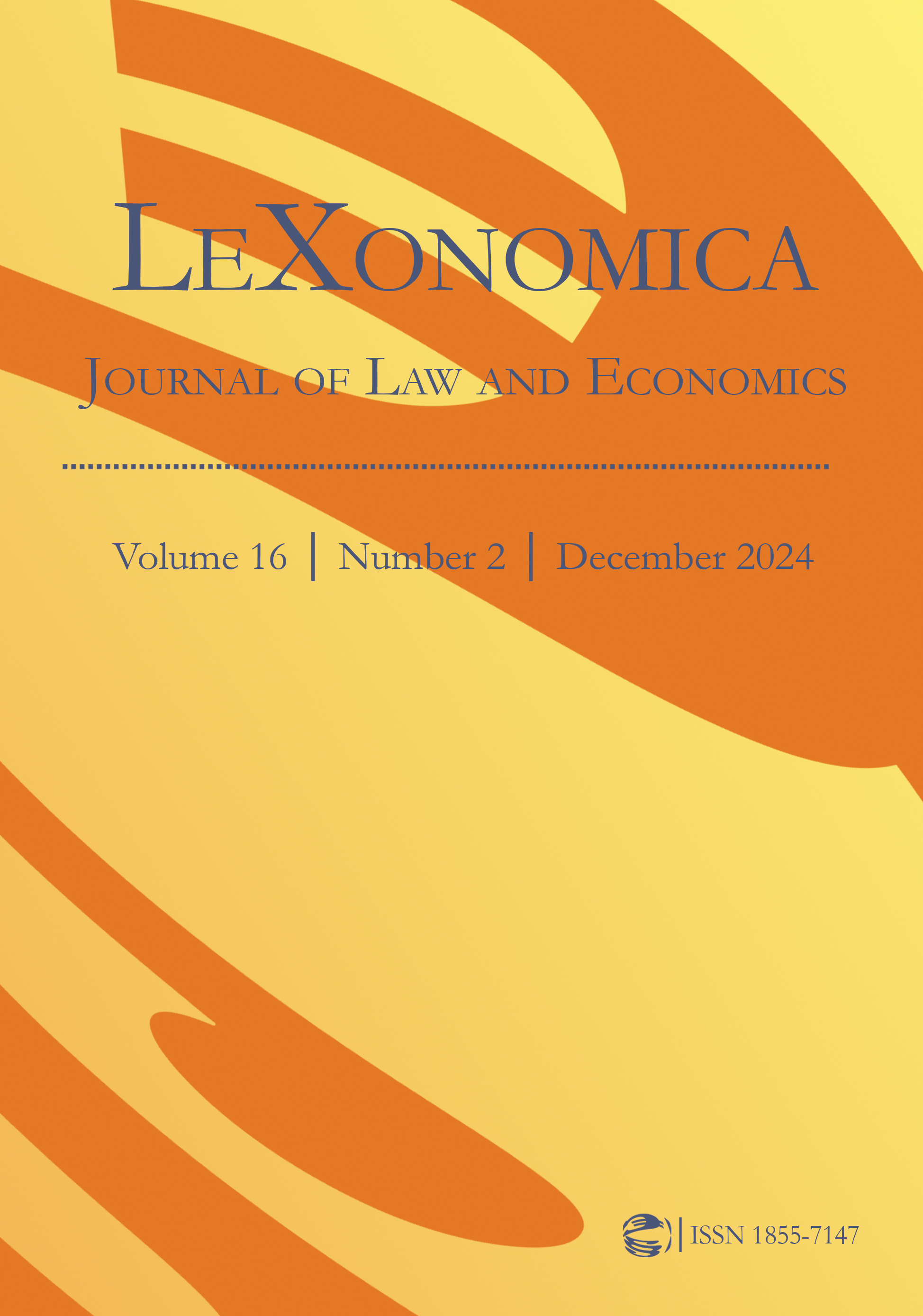A Plaidoyer on State Bankruptcy: Between Economic Reality and Legal Impossibility
DOI:
https://doi.org/10.18690/lexonomica.16.2.219-236.2024Keywords:
financial crisis, bankruptcy, regulations, state, reformAbstract
The history of financial crises and their serious consequences have made them a key interest for both academics and policymakers. During periods of economic growth, bankruptcy was mainly viewed as a mechanism to eliminate uncompetitive firms. However, current global economic conditions, including inflation, decreased demand, rising production costs, the energy crisis, and financial collapses in certain markets, have made it difficult for many companies to service their debts. Outdated bankruptcy regulations have worsened the situation. In the context of globalization and the internationalization of business, modernizing bankruptcy laws has become essential. Various international institutions have advocated for reforms, including redefining the concept of state bankruptcy. This paper aims to analyze the role of the state in bankruptcy, focusing not on its role as a commercial creditor or debtor but as a potential subject of bankruptcy itself.
Povzetek
Zgodovina finančnih kriz in njihove resne posledice so postale ključnega pomena za akademike in oblikovalce politik. V obdobjih gospodarske rasti se je na stečaj gledalo predvsem kot na mehanizem za izločitev nekonkurenčnih podjetij. Vendar so sedanje svetovne gospodarske razmere, vključno z inflacijo, zmanjšanim povpraševanjem, naraščajočimi proizvodnimi stroški, energetsko krizo in finančnimi zlomi na nekaterih trgih, mnogim podjetjem otežile odplačevanje dolgov. Zastareli stečajni predpisi so razmere še poslabšali. Zaradi globalizacije in internacionalizacije poslovanja je posodobitev stečajne zakonodaje postala nujna. Različne mednarodne institucije so se zavzele za reforme, vključno s ponovno opredelitvijo koncepta državnega stečaja. Namen tega prispevka je analizirati vlogo države v stečaju, pri čemer se ne osredotočamo na njeno vlogo kot poslovnega upnika ali dolžnika, temveč kot potencialnega subjekta samega stečaja.
Downloads
References
Bankruptcy Act, Official Gazette, No. 71/2015, 104/2017 and 36/2022.
Bodul, D. (2012) “Zakonska regulacija stečaja nad jedinicama lokalne samouprave – komparativna rješenja i hrvatska perspektiva”, Zbornik Pravnog fakulteta Sveučilišta u Rijeci, 33(1), p. 413-443.
Bodul, D., Jakovac P. and Tomljanović, M. (2022) „Economic and Legal Analysis of the Supreme Court's President Report Regarding Bankruptcy Cases: Starting Theses“. In: Economic and Social Development (Book of Proceedings): 80th International Scientific Conference on Economic and Social Development and 10th International OFEL Conference "Diversity, Equity and Inclusion: The Essence of Organisational Well-Being", Eds. Tipurić, D., Krajnović, A. and Recker, N., Zagreb: Varazdin Development and Entrepreneurship Agency, University North, Governance Research and Development Centre, University of Dubrovnik, p. 20-27.
Bodul, D., Tomljanović, M. and Jakovac, P. (2022) “Stečajna regulativa kao intervencionistička mjera ekonomske politike – hrvatska iskustva”, Journal of the Polytechnic of Rijeka, 10(1), p. 265-278.
Clark, R.C. (1977) „The Duties of the Corporate Debtor to Its Creditors“, Harvard Law Review, 90, p. 505-513.
Consumer Bankruptcy Act, Official Gazette, No. 100/2015, 67/2018 and 36/2022.
Dumičić, M. and Pečarić, M. (2016) “Značaj makroprudencijalne politike u sklopu ekonomske politike“, Economics / Ekonomija, 22(2), p. 265-281.
IMF – International Monetary Fund (1999) “Orderly and Effective Insolvency Procedures”, https://www.imf.org/external/pubs/ft/orderly/ (accessed 23 May, 2023).
Kindleberger, C. and Aliber, R. (2005) Manias, panics and crashes: A history of financial crises, New York: Wiley.
MRRFEU - Ministarstvo regionalnog razvoja i fondova Europske unije (2023),
https://thedocs.worldbank.org/en/doc/445241604615163404-080022020/original/14
Upravljanjedrzavnomimovinom.pdf (accessed 23 May, 2023).
Paulus, C. (2022) “Some Thoughts on an Insolvency Procedure for Countries“, The American Journal of Comparative Law, 50(3), p. 531-553.
Posner, R. (1971) “Taxation by Regulation”, The Bell Journal of Economics and Management Science, 2(1), p. 22-50.
Posner, E., Choi, S. and Gulati, M. (2010) “Pricing Terms in Sovereign Debt Contracts: A Greek Case Study with Implications for the European Crisis Resolution Mechanism“, John M. Olin Program in Law and Economics Working Paper, No. 541, https://chicagounbound.uchicago.edu/cgi/viewcontent.cgi?article=1376&context=law_and_economics (accessed 23 May, 2023).
Priest G. (1993) “The Origins of Utility Regulation and the "Theories of Regulation" Debate”, Journal of Law and Economics, 36(1), p. 289-323.
Ribnikar, I. (2011) “Capitalism, advanced and “transitional”, unfolded during the financial crisis”, Proceedings of Rijeka Faculty of Economics: Journal of Economics and Business, 29(1), p. 89-107.
Roje, G. (2011) “Ključne postavke i aktivnosti u sustavu upravljanja državnom imovinom”. In: Zbornik radova s konferencije Instituta za javne financije - Hrvatski javni dug: upravljanje i izazovi razvoja tržišta, Eds. Bajo, A., Ott, K and Mihaljek, D., Zagreb: Institut za javne financije, p. 237-254.
Sever, I. (2009) “The starting points of new economic policy in the conditions of recession”, Proceedings of Rijeka Faculty of Economics: Journal of Economics and Business, 27(2), p. 217-262.
Stigler, G. (1971) “The Theory of Economic Regulation”, The Bell Journal of Economics and Management Science, 2(1), p. 3-21.
Stigler, G. (1974) “Free Riders and Collective Action: An Appendix to Theories of Economic Regulation”, The Bell Journal of Economics and Management Science, 5(2), p. 359-365.
Stojanov, D. (2009) “Keynes and economic crisis: some reconsiderations”, Proceedings of Rijeka Faculty of Economics and Business, 27(2), p. 293-310.
Tilly, C. (1975) „Reflections on the History of European State-making“. U: Tilly, C. (ur.) The Formation of National States in Western Europe, Princeton: Princeton University Press.
UNCITRAL - United Nations Commission on International Trade Law (2005) “Legislative Guide on Insolvency Law”, https://uncitral.un.org/sites/uncitral.un.org/files/media-documents/uncitral/en/05-80722_ebook.pdf (accessed 23 May, 2023).
Vuković, A. and Bodul, D. (2012) „Stečajno zakonodavstvo u tranziciji - komparativni osvrt, hrvatski izazovi i potencijalna rješenja“, Zbornik radova Pravnog fakulteta u Splitu, 49(3), p. 633- 661.
World Bank (2021) “Principles and Guidelines for Effective Insolvency and Creditor Rights Systems”, https://openknowledge.worldbank.org/handle/10986/35506 (accessed 23 May, 2023).
Downloads
Published
Issue
Section
License
Copyright (c) 2024 University of Maribor, University Press

This work is licensed under a Creative Commons Attribution-NonCommercial-NoDerivatives 4.0 International License.
© Univerza v Mariboru, Pravna fakulteta, Univerzitetna založba
Prosti pristop
